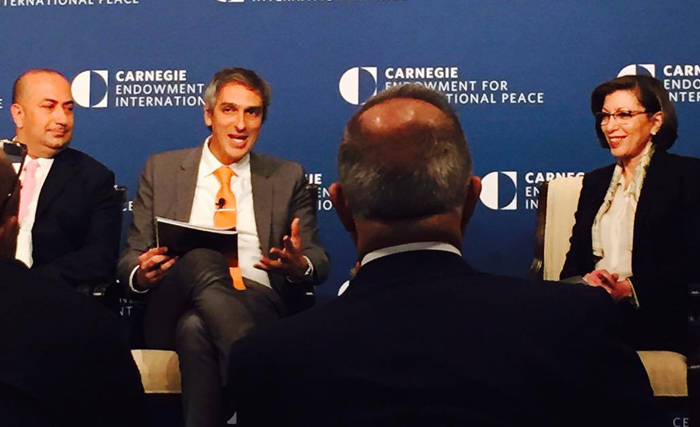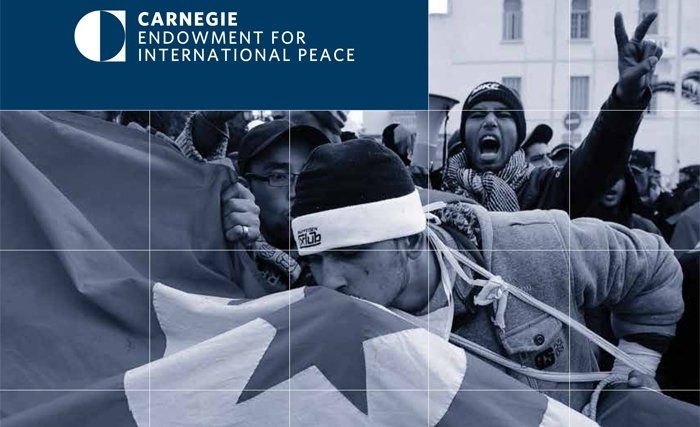Washington DC – Correspondance particulière pour Leaders - En marge des réunions annuelles du printemps de la Banque mondiale et du FMI cette semaine à Washington, Carnegie a révélé ce jeudi 14 avril un important rapport spécial consacré à notre pays intitulé: "Entre péril et promesse : un nouveau cadre de partenariat avec la Tunisie". Elaboré par Marwan Muasher, Marc Pierini, et Alex Djerassi, il a été présenté lors d’un déjeuner organisé ce jour dans la capitale fédérale sous la double présidence de Yassine Brahim, ministre du Développement, de l’Investissement et de la coopération internationale et Tony Blinken, sous-secrétaire américain aux Affaires étrangères. Un panel de discussion était constitué à cette occasion de : William J. Burns, Bowman Cutter, Naceur Hidoussi, Mohamed Malouche et Samia Msadek.
Le rapport appelle la communauté internationale à doubler son soutien à la Tunisie afin qu’elle puisse réussir sa transition démocratique, assure sa relance économique et son développement social, et intensifie sa lutte contre le terrorisme. Il recommande l’élaboration et la mise en place d’un nouveau cadre de partenariat qui inclut une coordination plus efficace des contributions des donateurs et un appui plus substantiel aux mécanismes déployés par le gouvernement tunisien.
La réussite de la stabilisation de la Tunisie, écrivent les auteurs de ce rapport, apportera la démonstration du potentiel qu’offre un système politique pluraliste et responsable dans le monde arabe et inspire des fondements solides pour faire face systématiquement aux défis ».
Ils estiment que le sommet du G7, en mai prochain (au Japon), l’Assemblée générale des Nations Unies en septembre et la conférence sur l’investissement que la Tunisie compte organiser offrent des opportunités pour formuler ce partenariat et le mettre en œuvre par le lancement et l’habilitation des mécanismes de coordination et d’action immédiate.
Si la première partie du rapport dresse un diagnostic avisé des multiples défis qui s’exercent face à la Tunisie et les dangers sécuritaires qui la guettent, la seconde, consacrée aux recommandations, est intéressante à examiner.
.jpg)
Tunisia’s inclusive democratic development and its resolve against terrorism have won it widespread admiration. But five years after the revolution, internal headwinds and regional whirlwinds continue to bedevil the country, jeopardizing its democratic transition. Tunisians are still waiting for the social and economic grievances that provoked the 2011 revolution to be addressed. To halt the country’s troubling trajectory, address its socioeconomic challenges, and help achieve the revolution’s aims of prosperity, freedom, and dignity, Tunisia and its international partners need a new approach—a Framework for Partnership that couples Tunisian-led reform actions with coordinated and intensified international assistance.
Tunisia’s Transition Is Stalling
Beset by corruption, legal, bureaucratic, and security challenges, the Tunisian economy is hurting. Promised growth, development, and infrastructure projects have yet to materialize. Disillusionment among Tunisians is increasing and with it the risk that the consensual fabric that has kept the country afloat and moved it forward may tear.
A slide into instability would leave Tunisia more vulnerable to terrorism, add to the crisis in Libya and uncertainty in Algeria, and send thousands more Tunisians into the arms of extremist groups or to join the migrant journey to Europe.
Success and stability in Tunisia would demonstrate the potential for a pluralist and accountable political system in the Arab world and suggest a foundation for tackling the region’s systemic challenges.
Tunisia’s financing needs are not massive. In fact, modest levels of focused and strategic support could have an outsized impact if leveraged effectively. To date, international coordination and follow-through has been lacking, making hard choices about meaningful reforms more difficult.
Tunisians have to do their part. Too much assistance and too many projects are mired in a bureaucratic morass inherited from the previous regime. Unless in the first instance Tunisians are able to work around that morass and in the long term revitalize core government functions, no level of international support will make any difference.
 A Pragmatic Approach to Tunisia’s Success
A Pragmatic Approach to Tunisia’s Success
The Tunisian government and its core international partners should establish a new Framework for Partnership based on reciprocal commitments in five complementary areas.
Tunisia’s core international partners, with Tunisian cooperation, could:
Intensify engagement with and assistance to Tunisia to help support urgent priorities. International participation in a Framework for Partnership should be robust, including through financial aid and trade concessions, and should incentivize those actions that will make international assistance more effective and encourage economic growth.
The government of Tunisia, with international support, could:
Lead a G7+ coordination mechanism for economic assistance to foster transparency, accountability, and follow-through. Tunisia’s core international partners should participate in the effort, with civil society and private-sector actors associated as needed. An assistance coordination mechanism can help to generate and advance high-priority reciprocal commitments from all parties.
Revitalize public outreach and launch an inclusive dialogue with all stakeholders about public policies and new laws. Political games have sapped citizen confidence in the reform process. Unless the government rededicates itself to genuine and rigorous consultation with civil society, reform efforts will remain grounded.
Advance reforms that can gain public buy-in and remove obstacles to economic growth, particularly in marginalized communities. Prioritizing, drafting, passing, and implementing these reforms, as well as improving the overall capacity of the parliament, is a substantial undertaking on which Tunisian and international actors must continue to focus.
Establish a fast-track mechanism to implement projects aimed at fostering economic and social development and creating jobs. New procedures for cross-ministerial coordination, procurement, and security for development projects are needed to transform domestic and external financing into concrete results for Tunisians, particularly youth and marginalized communities.
The G7 summit in May 2016, the United Nations General Assembly in September, and Tunisia’s anticipated fall investment conference are opportunities to formulate this partnership and put it into action, initially by launching and empowering its coordination and fast-track mechanisms. As Tunisia’s partners show further commitment to the country’s transition and the Tunisian leadership moves forward on reforms and project delivery, a powerful dynamic could ensue, with each party’s steps making the other’s more effective.

.jpg) Tunisia’s inclusive democratic development and its resolve against terrorism have won it widespread admiration. But five years after the revolution, internal headwinds and regional whirlwinds continue to bedevil the country, jeopardizing its democratic transition. Tunisians are still waiting for the social and economic grievances that provoked the 2011 revolution to be addressed. To halt the country’s troubling trajectory, address its socioeconomic challenges, and help achieve the revolution’s aims of prosperity, freedom, and dignity, Tunisia and its international partners need a new approach—a Framework for Partnership that couples Tunisian-led reform actions with coordinated and intensified international assistance.
Tunisia’s inclusive democratic development and its resolve against terrorism have won it widespread admiration. But five years after the revolution, internal headwinds and regional whirlwinds continue to bedevil the country, jeopardizing its democratic transition. Tunisians are still waiting for the social and economic grievances that provoked the 2011 revolution to be addressed. To halt the country’s troubling trajectory, address its socioeconomic challenges, and help achieve the revolution’s aims of prosperity, freedom, and dignity, Tunisia and its international partners need a new approach—a Framework for Partnership that couples Tunisian-led reform actions with coordinated and intensified international assistance.  A Pragmatic Approach to Tunisia’s Success
A Pragmatic Approach to Tunisia’s Success
























